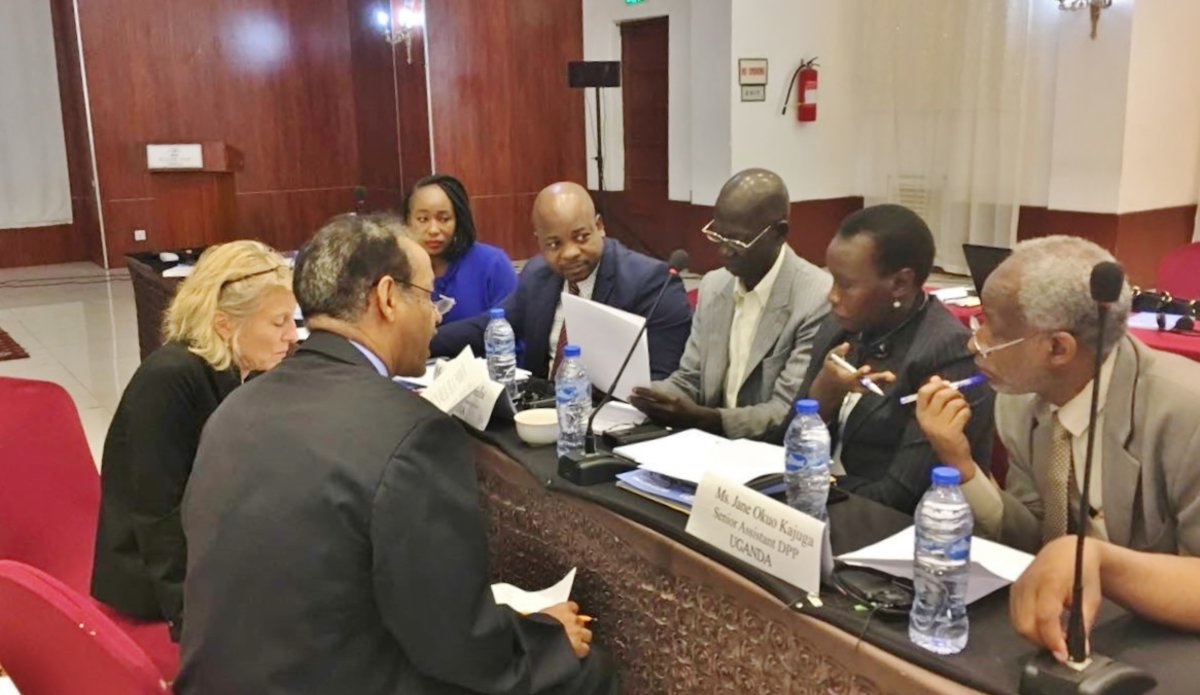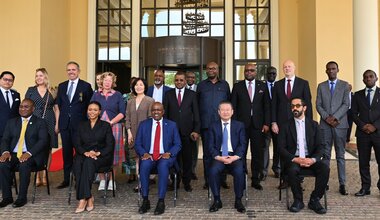Experts from the Great Lakes Judicial Cooperation Network meet in Khartoum and join forces against cross-border crime
Khartoum, 6 November 2017 – The International Conference on the Great Lakes Region (ICGLR) with support from the United Nations Office for the Great Lakes region and the United Nations Office on Drugs and Crime (UNODC), organized the first meeting of the Great Lakes Judicial Cooperation Network in Khartoum, Sudan, on 1-2 November 2017. This meeting of the Great Lakes Judicial Cooperation Network is the first one since its establishment in November 2016.
The Great Lakes Judicial Cooperation Network is a tool to connect national Focal Points on judicial cooperation and to facilitate access to legislation and statistics. Crime within the Great Lakes region often has a cross-border element. The cross-border element of crimes cannot make successful investigation and prosecution so long as the countries of the region do not work together effectively. This impunity continues to fuel the cycles of violence, instability and displacement, and threatens sustainable peace, security and long-term prosperity in the region.
The objectives of this meeting were many folds, including to: elaborate on the legal tools of the network; brief on the implementation regarding the domestication and implementation of international legal tools (UN Convention on Transnational Organized Crime) and regional legal tools (ICGLR Protocol on Judicial Cooperation and related model legislation); identify challenges regarding the implementation of these tools and the legal operation of the Network; accelerate the establishment and functioning of judicial ‘central authorities’ who deal with requests for mutual legal assistance and extradition; obtain details on the cross-border crime of illegal exploitation of natural resources; train on drafting a request for mutual legal assistance on cross-border crime of illegal exploitation of natural resources; and develop the terms of reference of the Coordinator of this Network.
The establishment of the Judicial Cooperation Network can be traced back to the International Conference on the Great Lakes Region Pact on Security, Stability and Development for the Great Lakes region (ICGLR Pact) signed in Nairobi in 2006. It provides a legal framework governing relations among the ICGLR member states and the provisions of its 10 protocols, including the Protocol on Judicial Cooperation which aims to facilitate the matters of extradition, investigation, persecution and the exchange of information and documents.
In addition, the Peace, Security and Cooperation (PSC) Framework for the Democratic Republic of Congo (DRC) and the region signed in Addis Ababa in February 2013, builds on the goals of the ICGLR Pact. The leaders of the region have reiterated on numerous occasions the need to pursue efforts towards judicial cooperation to ensure effective progress in the fight against impunity for serious crimes and violations of human rights, including sexual and gender-based violence.
On 19 October 2017, heads of State and Government of the region met in Brazzaville, Republic of Congo, to assess progress made on their commitments under the 2013 PSC Framework. One commitment undertaken by the governments of the region was to facilitate the administration of justice through judicial cooperation within the region; a second commitment was to neither protect nor provide protection of any kind to persons accused of war crimes, crimes against humanity, acts of genocide or crimes of aggression, or persons falling under the UN sanctions region. In their Communique of 19 October 2017, the heads of State and Government of the region welcomed the establishment of the Network, and decided to ensure that those responsible for crimes against humanity be investigated and brought to justice in line with the ICGLR Protocol on Judicial Cooperation and international law.
The meeting was opened by Ms. Tahini Mohamed Ali, Sudanese Minister of State from the Ministry of Justice, and attended by directors of Public and Military Prosecution (or their representatives) from Burundi, DRC, Central African Republic, Kenya, South Sudan, Sudan, Tanzania, Uganda and Zambia.
 UN
UN





